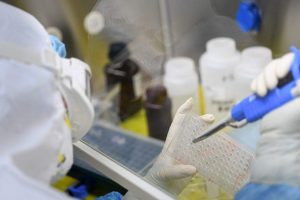Virology and Cell Technology
Research Team
- About
- Services
- Highlights
- Research Personnel
- Contact
Virology and Cell Technology Research Team


The Virology and Cell Technology Research Team studies the pathogenesis of viruses associated with important diseases of Thai livestock such as swine, cattle and poultry. Currently, viruses under research include orthomyxoviruses (influenza viruses), paramyxoviruses (Newcastle disease virus or NDV), coronaviruses (porcine epidemic diarrhea virus or PEDV), and circoviruses (porcine circovirus types 2, 3 or PCV2/3). Additionally, the team also studies zoonotic viruses such as influenza viruses and the rabies virus, which can cause in severe disease in both animals and humans.
The team has developed various platform technologies to facilitate the study of these viruses, including reverse genetics, which enables in vitro generation of viral particles, and gene editing of cells to improve propagation of viruses and vaccine strains. Additionally, bioinformatics, molecular biology and immunology approaches are also being integrated for cross-disciplinary problem solving.
Alongside the team’s scientific expertise and various platform technologies, collaboration with universities, public organizations, industry, and leading international research institutes is key to achieving our primary goal of developing vaccines for the Thai livestock industry. The goals in designing these vaccines are to provide more robust protection against strains relevant to the region and to reduce the cost of vaccination when compared to imported vaccines. Achieving these goals will help sustain and strengthen the competitiveness of the Thai livestock industry.
1. Development of a PEDV vaccine
Infection with PEDV is devastating for newborn piglets, resulting in severe diarrhea, high mortality rates, and consequently massive losses to the Thai swine industry. While commercial vaccines are available on the market, they do not provide sufficient protection due to mismatches with strains circulating in the region. This problem is further exacerbated by the limited ability of injected vaccines to induce protective gut mucosal immunity. To clarify the biology at the root of these problems, the team has been studying the PEDV life cycle and mechanisms of pathogenesis, and was the first to report the successful development of an infectious molecular clone, facilitating the generation of PEDV in the laboratory (Jengarn et al, 2015).
This reverse genetics technology has been applied towards the study of viral proteins and their roles in virus infection and replication. This includes research into the function of the spike protein, which mediates cell entry (Wanitchang et al, 2018; 2019), the nucleocapsid which encapsidates the viral RNA genome (Jaru-Ampornpan et al, 2017; Sungsuwan et al, 2020), and ORF3, an accessory protein that may act as a determinant of virulence (Wongthida et al, 2017; Kaewborisuth et al, 2018; 2019).
These technologies and the knowledge gained from these studies are being channeled into the development of a live attenuated vaccine. The vaccine has been designed to express spike proteins from regional outbreak strains to improve protection of Thai herds while remaining viral genes have been selected from either vaccine or outbreak strains in order to optimize the balance between high growth for production, retention of infectivity for effective induction of immune responses, and low virulence to avoid disease in vaccinated animals. Currently, a vaccine candidate is undergoing safety trials in experimental animals.
2. Development of a PRRSV vaccine
PRRSV is another virus that had devastating impact on the Thai swine industry. Infection results in suppression of the immune system, resulting in systemic infection, abortions in pregnant sows, and death of newborn piglets. A vaccine effective against strains circulating in Thailand is urgently needed.
Research in this area involves the development of platform technologies to facilitate vaccine development, such the use of Gibson assembly (Suhardiman et al, 2015) and other approaches for the generation of infectious molecular clones, and the engineering of cells that can be used to propagate PRRSV to high titers.
Additionally, vaccine development is also underway, with the goal of generating a live attenuated vaccine using bioinformatics to design antigens that can elicit broadly protective immune responses.
Currently, vaccine candidates are being tested for immunogenicity in experimental animals. (This work is supported by the Newton Fund, and is being done in collaboration with the Pirbright Institute, UK.)
3. Development of a PCV2 subunit vaccine
PCV2 suppresses the swine immune system, resulting in opportunistic infections. In more severe cases, drastic weight loss and death can occur. Although commercial vaccines are available against swine circoviruses, importation of vaccines significantly increases production costs. Additionally, mismatch between the vaccine and regional outbreak strains could possibly reduce vaccine efficacy.
The team is therefore working on the development of a cheaper subunit vaccine with at least equal efficacy based on the capsid protein of PCV2 strains found in Thailand. Work is also underway to develop a vaccine against the newly discovered PCV3. Recombinant proteins are being expressed by microbial systems. (This work is supported by GCRF and UKRI, and being done in collaboration with the University of Kent, University College London, Imperial College London, London School of Hygiene and Tropical Medicine and King Mongut’s University of Technology Thonburi.)
4. Development of an NDV vaccine
Many NDV vaccines are available, whether in the form of inactivated or live attenuated vaccines based on attenuated strains such as La Sota or B1. Unfortunately, their efficacy is suboptimal, especially in regions where the virulent genotype VII is common.
The team is developing a new NDV vaccine based on a genotype VII strain genetically modified to minimize virulence by reducing its ability to evade the host innate immune response and modifying other determinants of viral pathogenicity. Development of an infectious molecular clone is underway. (The work is supported by the Newton Fund, and being done in collaboration with St. George’s University of London and Imperial College London.)
5. Development of induced pluripotent stem cells (iPSCs)
Cell line engineering is a key technology for the study of viral pathogenesis and vaccine development. Because available cell lines may not always be adequate for propagation of certain viruses, gene editing of cells through lentivirus or CRISPR/Cas9 technology can address this issue by increasing expression of necessary host or viral factors or by eliminating expression of restriction factors.
iPSC technology can broaden cell substrate options for viral propagation and study by deriving specific cell types from specific host organisms. Thus far, the team has succeeded in generating swine iPSCs and differentiating them into a variety of cell types of interest, including intestinal epithelial cells for the study of PEDV and neuronal cells for the study of highly pathogenic PRRSV exhibiting neural tropism.
Furthermore, work is proceeding towards organoid culture, which will allow three-dimensional study of viral infection in more physiological conditions.
Virology and Cell Technology Research Team


Peera Jaruampornpan
Research Team Leader
Principal researcher

Surapong Koonpaew
Researcher

Nanchaya Wanasen
Researcher

Samaporn Teeravechyan
Researcher

Phanramphoei Namprachan Frantz
Researcher

Thanathom Chailangkarn
Researcher
Contact
Virology and Cell Technology Research Team (AVCT)
Veterinary Health Innovation and Management Research Group (AVIG)
Tel: +66 2564 6700 ext. 3395, 3361
Email: peera.jar@biotec.or.th
Facebook: facebook.com/avctbiotec




